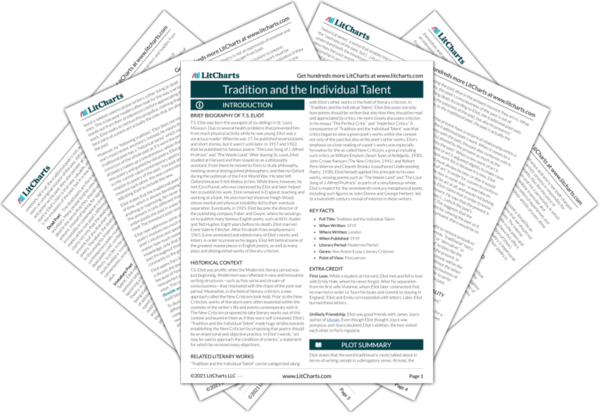Eliot uses platinum to symbolize the traditional poet. Near the end of Part I of “Tradition and the Individual Talent,” Eliot asks the reader to consider a phenomenon in which sulphur dioxide and oxygen combine to form sulphurous acid in the presence of a piece of platinum. In Part II, he describes the phenomenon in more detail. Significantly, nothing happens to these two elements when the platinum is not present; moreover, no trace of the platinum appears in the sulphurous acid. Even though it is essential to the transformation, the platinum itself remains unaffected by the process; it is only a catalyst.
The role of the piece of platinum in this phenomenon resembles the role of the traditional poet. First of all, Eliot claims that the poet’s role is to combine experiences and feelings in new ways so as to form new emotional effects in their poetry. While doing this, the poet keeps their personal experiences out of their poetry entirely, just like the platinum makes up no part of the sulphurous acid. Finally, the traditional poet’s personal life remains unaffected by their own poetry—like the platinum remains unaffected— because their poetry has nothing to do with their personal experiences and emotions. The traditional poet depersonalizes their poetry by remaining entirely separate from it, in the same way that the platinum is responsible for the creation of sulphurous acid but is itself not a part of its composition.
The platinum is a symbol for visualizing all the things that Eliot says a traditional poet does: the traditional poet makes use of timeless emotions and feelings (sulphur dioxide and oxygen) and transmutes them. Also, the traditional poet keeps their work impersonal: the poet doesn’t get emotionally involved in it or become changed by it.
Platinum Quotes in Tradition and the Individual Talent
The mind of the mature poet differs from that of the immature one not precisely in any valuation of “personality,” not being necessarily more interesting, or having “more to say,” but rather by being a more finely perfected medium in which special, or very varied, feelings are at liberty to enter into new combinations.

Unlock explanations and citation info for this and every other Tradition and the Individual Talent quote.
Plus so much more...
Get LitCharts A+The more perfect the artist, the more completely separate in him will be the man who suffers and the man who creates; the more perfectly will the mind digest and transmute the passions which are its material.












